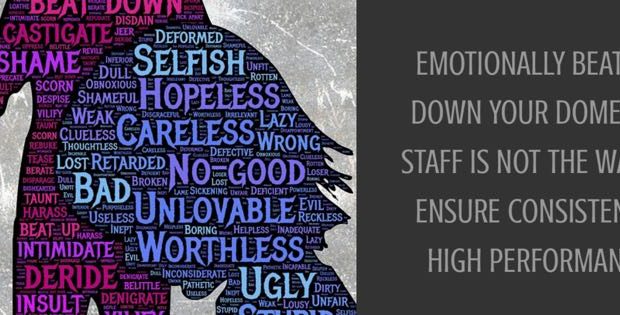There is something menacing that goes in Nigerian households that we conveniently disregard. We treat domestic staff as if they are incapable of feeling and expressing human emotions. We shower them with so much disapproval and criticism, yet we don’t realise that it’s the cause of their poor performance.
If you have staff coming and going as night and day, then there’s something you’re not paying attention to. It could be a “them” factor, but it could also be you. In fact, it could be a lot of things! It could be the working conditions, the kind of people you employ or consider suitable for the job(s), your attitude towards your staff, the workload, a lot that you probably don’t pay attention to. I honestly believe that it takes a special grace to effectively manage domestic staff, if you’ve never worked in a HR capacity in a corporately responsible organisation. Some have that grace naturally, others acquire it through attentive hiring of personal staff over a long period of time. Of course, some don’t even have that grace or ever get it.
Now, the set of people I want to focus on — if it’s not already obvious — is the one that does not know how to effectively manage domestic staff. The people in that category have their staff coming and going as if they were on a one-off rota. It shouldn’t be so. Wait. Let me even put a disclaimer here: I am no expert in personnel management or in people study. I just write from the perspective of one who is attentive to the workings of everyday life, and one who understands the need to understand people and their effective management.
So, back to the topic at hand. Are you an employer or a master? Yes, there’s a world of difference between the two. Let’s take another paragraph.
****
Employer-Employee
Based on my observations and on the workings of standard employment, an employer is aware that an employee is a human being with blood running through their veins. The employer ensures that the working environment and conditions are as suitable for the employee, as he (the employer) would like them to be for him. The job needs to be done after all, hence the need for someone else to do it. There is a contract (written or implied) of employment, because the employer is aware that the employee has freewill and is not his property. The employer is aware that the employee has rights and interests that must be protected and not encroached upon. Essentially, the employer has a duty to the employee, to be fair to him in all ramifications as are applicable to the employment.
Likewise, the employee has a duty to his employer, to be diligent in his work and to abide by and be bound by the terms of his contract. He understands that he was chosen among others, and chosen to take up the offer of employment. He understands that this does not vitiate his freewill to leave the job, if he is no longer comfortable with it.
****
Master-Servant
A master orders his servants around. They’re there solely to serve his interests and to satisfy his demands. They don’t have a say in operations or how things are done; things are done however the master would like them done. The best part? Every party to this arrangement understands this. Each understands that there is a hierarchy of power that needs to be maintained for everyone to hold their positions. The master knows that the servants are at his beck and call; the servants know that the master’s wish is their command. There is no protection in place for the servants, there is no recognition of their rights or of their feelings, under the service of their master. There is no agreement of fairness or of recognition or protection of rights, nothing is guaranteed!
Now, that is one arrangement that is common in Nigerian households. People take on domestic staff as employees but end up treating them like servants whose rights are not respected and whose emotions aren’t taken into consideration. Some even demean and emotionally wear down their domestic staff so that they feel as if their employers are their only source of life. They break their staffers’ spirits so that they are defenceless and totally dependent on them. That is anything but humane and it shames me to say that I know a few people like that.
That wearing down of their spirit and the abuse – emotional or physical – significantly diminishes the quality of their output and utility. It’s like trying to power an entire house on a ridiculously low electricity current; it won’t work! Things might blow up, the current may not even power some things.
Staff in any kind of employment are humans just like you and I, and you should treat them the way you’d have them treat you and your possessions. Learn to appraise your staff and constructively criticise them when the need arises. The same way you need incentive and motivation to keep at your daily grind is the same way your domestic staff need to be encouragement from you and your attitude towards them.
Stay blessed!










